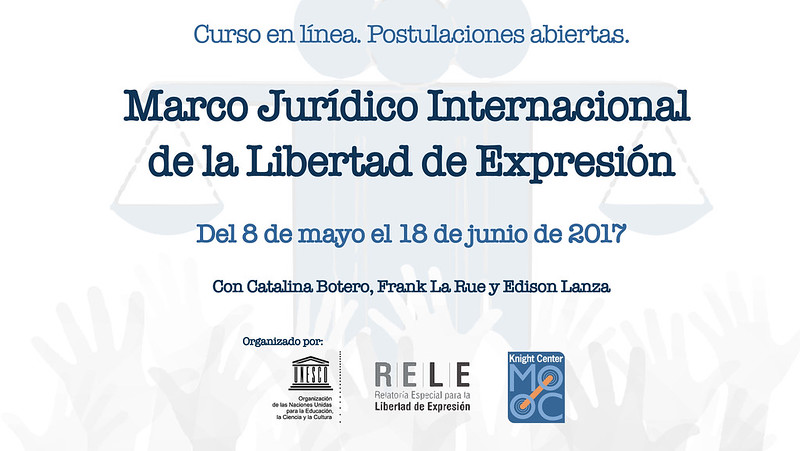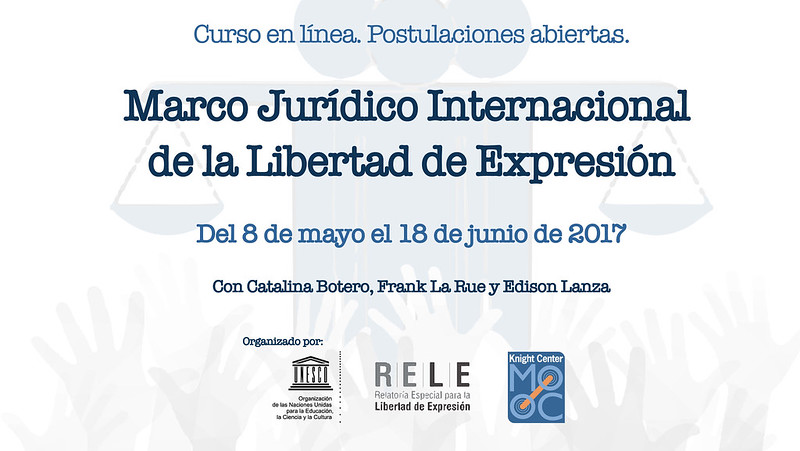
More than 3,000 judges and other justice system operators in Latin America have been trained in the last three years through the Spanish-language online course “International Legal Framework on freedom of expression, access to public information and protection of journalists.” A new version of this course has just been announced and will be offered starting May 8, 2017.
These innovative courses for judges are an initiative of the United Nations Educational, Scientific and Cultural Organization (UNESCO) and the Special Rapporteur for Freedom of Expression of the Inter-American Commission on Human Rights (IACHR), in collaboration with the Knight Center for Journalism in the Americas at the University of Texas at Austin.
It’s been such a success that the Ibero-American Judicial Summit declared it “of interest” and urged the organizing parties to offer more training courses.
The objective of this program is for more justice operators in the region, especially judges, to reinforce their knowledge about the international standards that govern freedom of expression, access to public information and protection of journalists.
Applications will be open until April 30. The application process consists of the following steps: 1.) submit the application form that is available here. 2.) If your application is accepted, you will receive an email from the Knight Center. Please allow at least 72 hours to receive this first email. 3.) Once you receive the email informing you that your application has been accepted, you must create an account at JournalismCourses.org, the Knight Center’s digital teaching platform where the course will be taught.
It is important that the email sent in the application form (point 1) is the same one that you use to create the account in our platform (point 3).

The introductory module will open on April 3 and participants can then access the course. The six modules included in the course will open on May 8.
“This is a joint effort of the Rapporteur and UNESCO with the objective of cooperating with the Judicial Powers of the region in the substantive training of judges on the complex subject of the content and scope of freedom of expression,” said Edison Lanza, Special Rapporteur for Freedom of Expression of the IACHR who will also participate in this edition as an instructor.
“This space for interaction and dialogue between the Inter-American Human Rights System and justice operators in Latin America is essential for promoting the incorporation of regional standards into national jurisprudence. It is also the most effective way to guarantee national justice in cases of freedom of expression,” Lanza added.
As in previous editions of the course, Lanza will be joined by Catalina Botero, former Special Rapporteur for Freedom of Expression of the IACHR, and Frank La Rue, Unesco’s Assistant Director-General for Communication and Information and former UN Special Rapporteur for on the Promotion and Protection of the Right to Freedom of Opinion and Expression.
The course will be taught from May 8 to June 18, 2017. Each weekly module consists of video lessons, reading material, quizzes, discussion forums and other assigned activities.
This addition also has additional topics given by Lanza that are focused on jurisprudence.
It is an asynchronous course, meaning that there are no live activities. In this way, classes and activities can be carried out at the student’s pace, in the days and hours that best suit them.
Students who successfully complete course assignments, including quizzes, may download a certificate of completion, which does not have any academic credit, but documents successful participation in this online program.
“It is an honor for us to participate once again in this innovative project from Unesco and the Special Rapporteurship of the IACHR to offer free training for judges and other Ibero-American justice operators on the international legal framework for freedom of expression, access to information and protection of journalists,” said Professor Rosental Alves, director of the Knight Center for Journalism in the Americas at the University of Texas at Austin.
“In previous courses, we have verified the effectiveness of our system that allows justice officials to take the course in the days and hours that suit them, over a period of six weeks,” Alves added.
The course is supported by the Ibero-American Network for Schools of Judges, the Foundation for Press Freedom, the Latin American Internet Association, the OAS School of Government and the Government of Sweden.
UNESCO and the Office of the Special Rapporteur, in collaboration with the Knight Center, offered a pilot version of this course exclusively for judicial operators in Mexico in November 2014. In September 2015, a similar course was offered exclusively for judicial operators and journalists in the state of Coahuila in Mexico. This was the first course of its kind in the world that was directed at the state level. At the end of 2015, the course was offered at the Latin American level, and the last took place during the first semester of 2016.
In total, more than 3,000 judges and other justice operators, like prosecutors and court officials from all Latin American countries (except Cuba), participated in the four previous editions of these courses.

Knight Center for Journalism in the Americas
300 West Dean Keeton
Room 3.212
Austin, TX, 78712
Phone: 512-471-1391
Email: journalismcourses@austin.utexas.edu